Unit 1 How often do you exercise? Section A精彩分析及试题[上学期]
文档属性
| 名称 | Unit 1 How often do you exercise? Section A精彩分析及试题[上学期] | 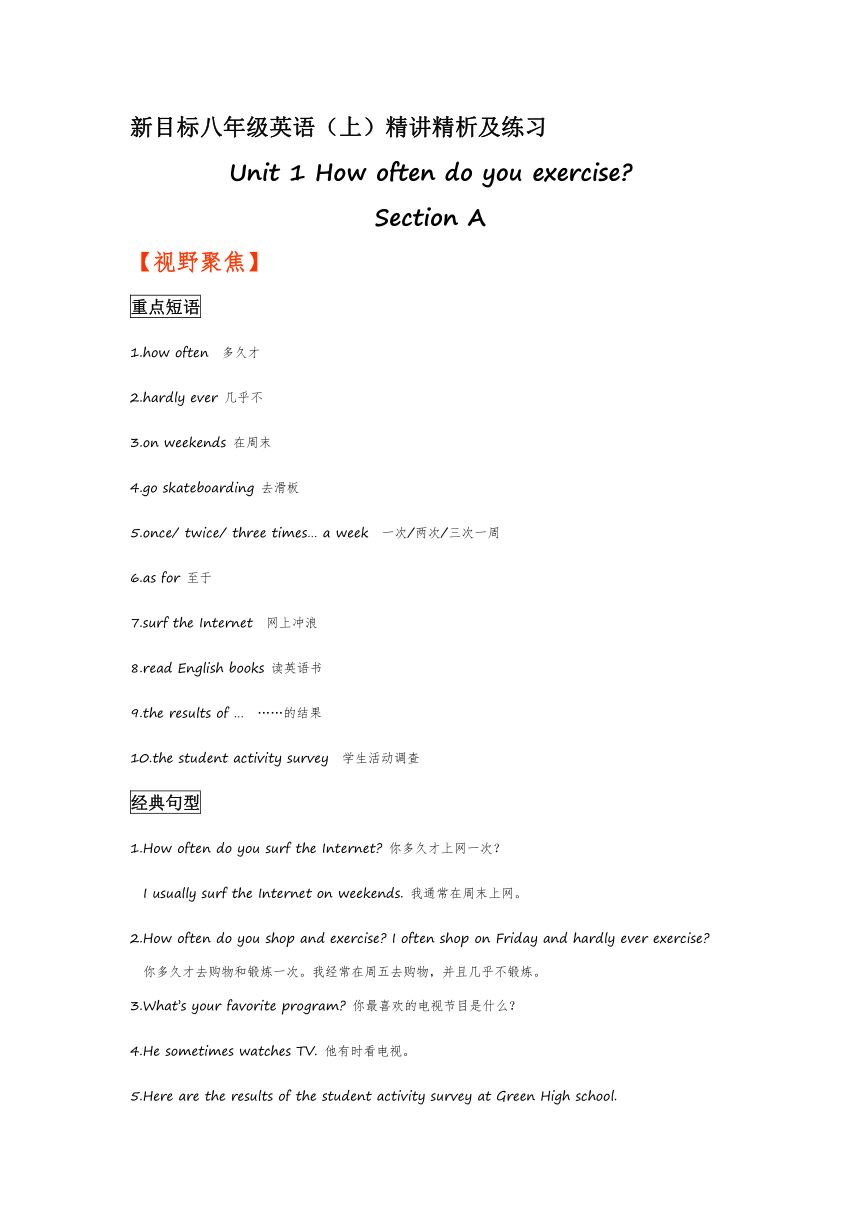 | |
| 格式 | rar | ||
| 文件大小 | 17.4KB | ||
| 资源类型 | 教案 | ||
| 版本资源 | 人教新目标(Go for it)版 | ||
| 科目 | 英语 | ||
| 更新时间 | 2008-02-19 17:35:00 | ||
图片预览

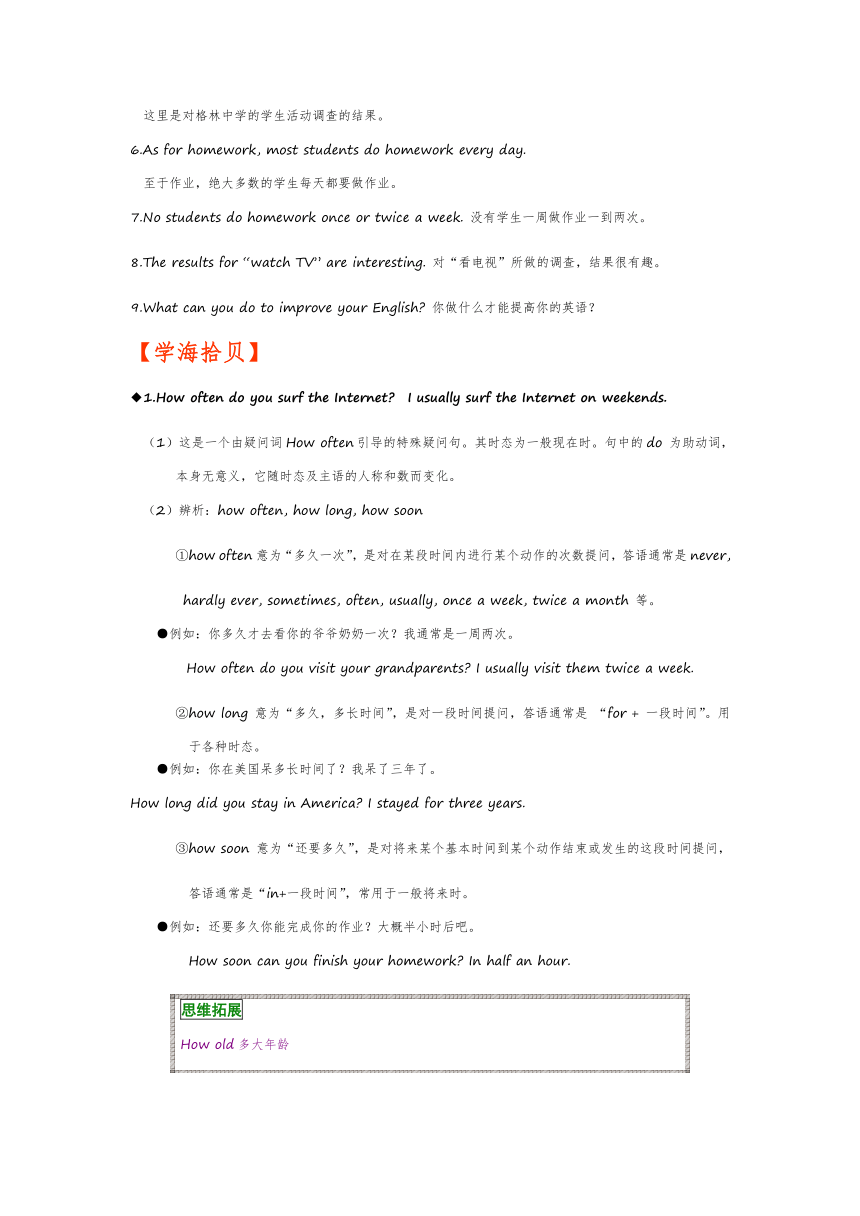
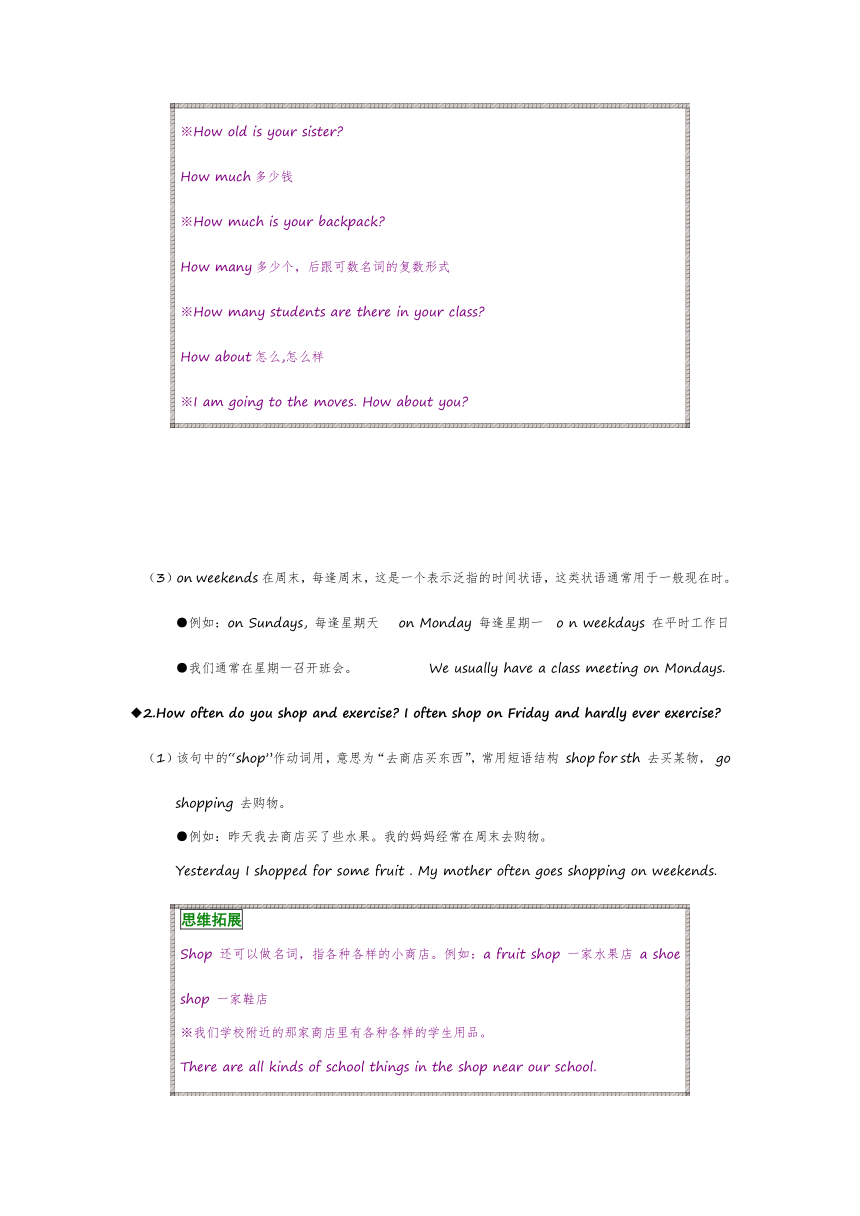
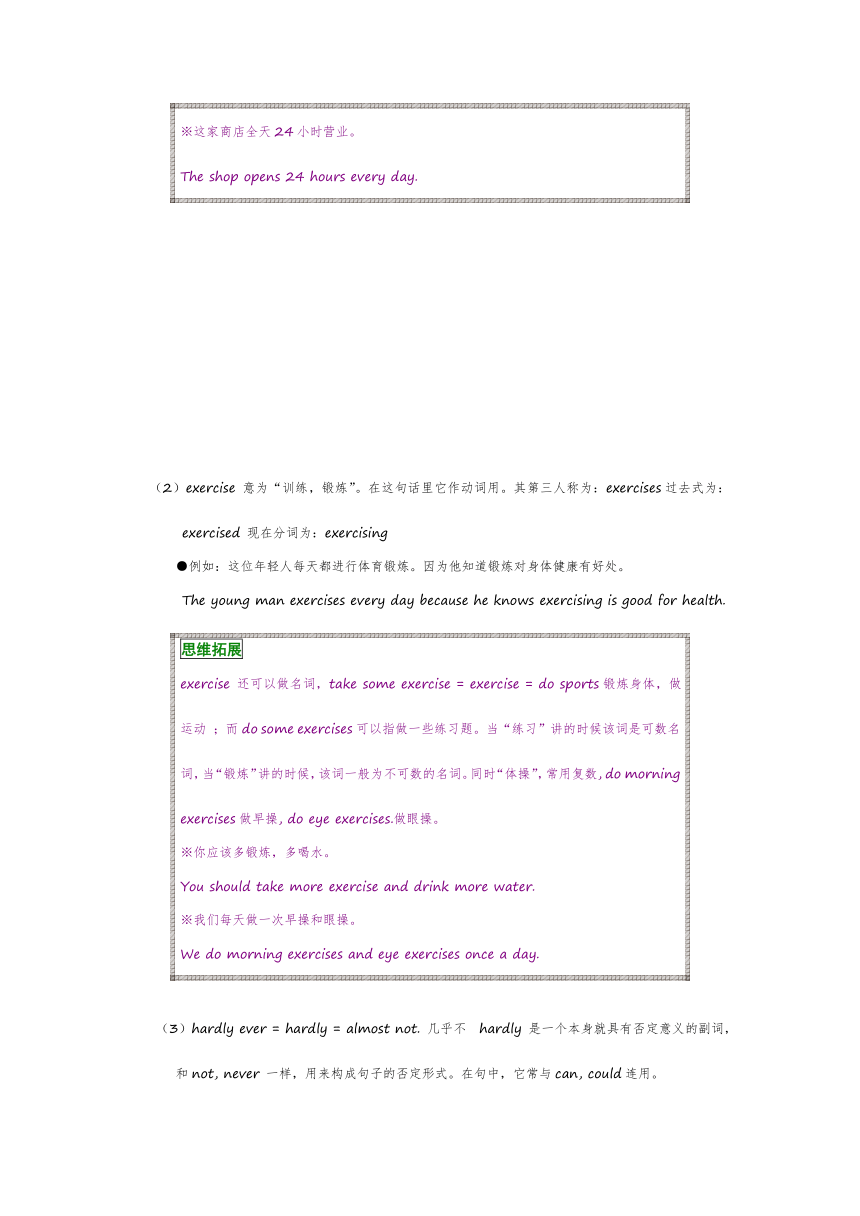
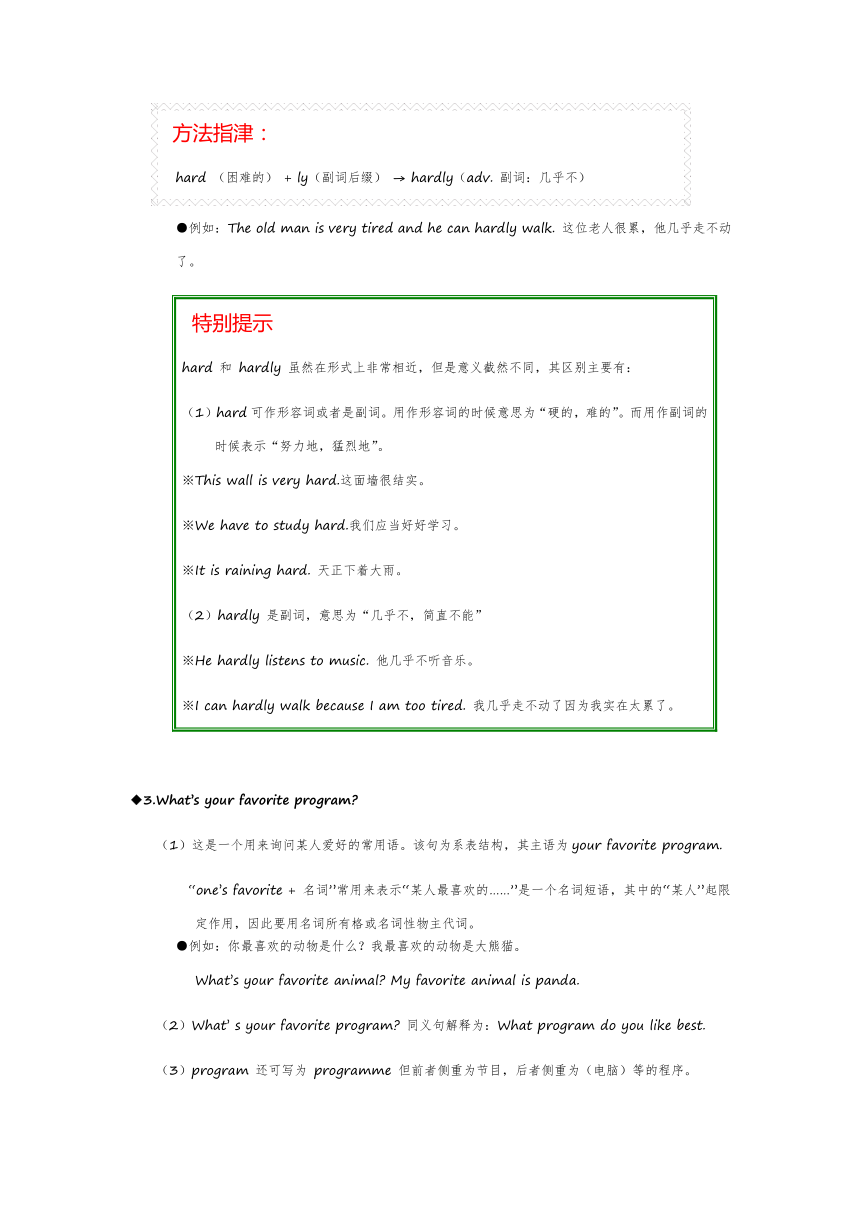
文档简介
新目标八年级英语(上)精讲精析及练习
Unit 1 How often do you exercise
Section A
【视野聚焦】
重点短语
1.how often 多久才
2.hardly ever 几乎不
3.on weekends 在周末
4.go skateboarding 去滑板
5.once/ twice/ three times… a week 一次/两次/三次一周
6.as for 至于
7.surf the Internet 网上冲浪
8.read English books 读英语书
9.the results of … ……的结果
10.the student activity survey 学生活动调查
经典句型
1.How often do you surf the Internet 你多久才上网一次?
I usually surf the Internet on weekends. 我通常在周末上网。
2.How often do you shop and exercise I often shop on Friday and hardly ever exercise
你多久才去购物和锻炼一次。我经常在周五去购物,并且几乎不锻炼。
3.What’s your favorite program 你最喜欢的电视节目是什么?
4.He sometimes watches TV. 他有时看电视。
5.Here are the results of the student activity survey at Green High school.
这里是对格林中学的学生活动调查的结果。
6.As for homework, most students do homework every day.
至于作业,绝大多数的学生每天都要做作业。
7.No students do homework once or twice a week. 没有学生一周做作业一到两次。
8.The results for “watch TV” are interesting. 对“看电视”所做的调查,结果很有趣。
9.What can you do to improve your English 你做什么才能提高你的英语?
【学海拾贝】
◆1.How often do you surf the Internet I usually surf the Internet on weekends.
(1)这是一个由疑问词How often引导的特殊疑问句。其时态为一般现在时。句中的do 为助动词,
本身无意义,它随时态及主语的人称和数而变化。
(2)辨析:how often, how long, how soon
①how often意为“多久一次”,是对在某段时间内进行某个动作的次数提问,答语通常是never, hardly ever, sometimes, often, usually, once a week, twice a month 等。
●例如:你多久才去看你的爷爷奶奶一次?我通常是一周两次。
How often do you visit your grandparents I usually visit them twice a week.
②how long 意为“多久,多长时间”,是对一段时间提问,答语通常是 “for + 一段时间”。用于各种时态。
●例如:你在美国呆多长时间了?我呆了三年了。
How long did you stay in America I stayed for three years.
③how soon 意为“还要多久”,是对将来某个基本时间到某个动作结束或发生的这段时间提问,答语通常是“in+一段时间”,常用于一般将来时。
●例如:还要多久你能完成你的作业?大概半小时后吧。
How soon can you finish your homework In half an hour.
思维拓展How old多大年龄※How old is your sister How much多少钱※How much is your backpack How many多少个,后跟可数名词的复数形式※How many students are there in your class How about怎么,怎么样※I am going to the moves. How about you
(3)on weekends在周末,每逢周末,这是一个表示泛指的时间状语,这类状语通常用于一般现在时。
●例如:on Sundays, 每逢星期天 on Monday 每逢星期一 o n weekdays 在平时工作日
●我们通常在星期一召开班会。 We usually have a class meeting on Mondays.
◆2.How often do you shop and exercise I often shop on Friday and hardly ever exercise
(1)该句中的“shop”作动词用,意思为“去商店买东西”,常用短语结构 shop for sth 去买某物, go shopping 去购物。
●例如:昨天我去商店买了些水果。我的妈妈经常在周末去购物。
Yesterday I shopped for some fruit . My mother often goes shopping on weekends.
思维拓展Shop 还可以做名词,指各种各样的小商店。例如:a fruit shop 一家水果店 a shoe shop 一家鞋店※我们学校附近的那家商店里有各种各样的学生用品。There are all kinds of school things in the shop near our school.※这家商店全天24小时营业。The shop opens 24 hours every day.
(2)exercise 意为“训练,锻炼”。在这句话里它作动词用。其第三人称为:exercises过去式为:exercised 现在分词为:exercising
●例如:这位年轻人每天都进行体育锻炼。因为他知道锻炼对身体健康有好处。
The young man exercises every day because he knows exercising is good for health.
思维拓展exercise 还可以做名词,take some exercise = exercise = do sports锻炼身体,做运动 ;而do some exercises可以指做一些练习题。当“练习”讲的时候该词是可数名词,当“锻炼”讲的时候,该词一般为不可数的名词。同时“体操”,常用复数, do morning exercises做早操, do eye exercises.做眼操。※你应该多锻炼,多喝水。You should take more exercise and drink more water.※我们每天做一次早操和眼操。We do morning exercises and eye exercises once a day.
(3)hardly ever = hardly = almost not. 几乎不 hardly 是一个本身就具有否定意义的副词,和not, never 一样,用来构成句子的否定形式。在句中,它常与can, could连用。
方法指津:hard (困难的) + ly(副词后缀) → hardly(adv. 副词:几乎不)
●例如:The old man is very tired and he can hardly walk. 这位老人很累,他几乎走不动了。
特别提示hard 和 hardly 虽然在形式上非常相近,但是意义截然不同,其区别主要有:(1)hard可作形容词或者是副词。用作形容词的时候意思为“硬的,难的”。而用作副词的时候表示“努力地,猛烈地”。※This wall is very hard.这面墙很结实。※We have to study hard.我们应当好好学习。※It is raining hard. 天正下着大雨。(2)hardly 是副词,意思为“几乎不,简直不能”※He hardly listens to music. 他几乎不听音乐。※I can hardly walk because I am too tired. 我几乎走不动了因为我实在太累了。
◆3.What’s your favorite program
(1)这是一个用来询问某人爱好的常用语。该句为系表结构,其主语为your favorite program.
“one’s favorite + 名词”常用来表示“某人最喜欢的……”是一个名词短语,其中的“某人”起限定作用,因此要用名词所有格或名词性物主代词。
●例如:你最喜欢的动物是什么?我最喜欢的动物是大熊猫。
What’s your favorite animal My favorite animal is panda.
(2)What’ s your favorite program 同义句解释为:What program do you like best.
(3)program 还可写为 programme 但前者侧重为节目,后者侧重为(电脑)等的程序。
●例如:他竭力想发明一种新的电脑程序。
He tries to make a new computer programme.
◆4.He sometimes watches TV.
知识点辨析:sometimes , some times, sometime, some time
(1) Sometimes意思为“有时”等于at times。表示动作发生的频率,用于现在时态或过去时态。
例如:After school I sometimes watch TV. 放学后我有时看电视。
She sometimes write a letter to her pen pal. 她有时给她的笔友写信。
(2) some times意思为“好几次”。表示动作发生的次数。
例如:He goes swimming some times every summer. 他每个夏天都要去游泳几次。
He visited the Great Wall some times last winter.他去年冬天游览了几次长城。
(3) sometime 意思为“在将来或过去的某个时间;有朝一日,在某时”。
例如:I will come to see you sometime tomorrow.我将在明天的某个时候来看你。
I saw her sometime last year. 去年我曾见过她。
(4) some time 意思为:“一段时间”。作副词词组时指一个未定的时间,意思为“某日,改日”,常于将来时连用。
例如:I waited for you for some time. 我等你等了一段时间了。
It took me some time to finish the job.完成这工作花费了我一段时间。
◆5.Here are the results of the student activity survey at Green High school.
(1)该句是倒装句。其主语为:the results of the student activity survey。因此谓语部分的be
用are.“Here +be+名词……”是一种在口语中运用很广泛的句子,是一种常见的倒装句。当你
要面对面地给对方某种东西或者给对方举例的时候,常使用这个句型。
●例如:这儿是一封给你的信。 Here is a letter for you.
(2)The result of 意思为“……的结果”
●例如:这儿是本次英语考试的结果。 Here is the result of the English exam.
◆6.As for homework, most students do homework every day.
(1)至于,关于,就……而言
●例如:我们都想去看电影,至于李雷,或许他只想呆在家里看电视。
We all want to go to the movies. As for Li Lei, maybe he only wants to stay at home and watch TV.
(2)most的两者用法。
※most adj. 大多数的,最多的。
●例如:大多数女孩子都喜欢穿漂亮衣服。
Most girls like wearing beautiful clothes.
※Most n. 大多数 “ most of + the +名词的复数”做主语的时候,当of后的名词是可数名词单数或不可数名词时,谓语动词用单数形式;当of后的名词是可数名词复数时,谓语动词用复数形式。
●例如:大多数的游人来自于美国。
Most of the visitors are from the USA.
Most of the apple has been eaten by rats.
那只苹果的大部分被老鼠吃了。
与其类似的用法的还有some, all, no.
※ Some students like the picture. =Some of the students like the picture.
※ No people want to go there. =None of the people want to go there.
※ Most children enjoyed themselves. =Most of the children enjoyed themselves.
◆7.No students do homework once or twice a week.
特别提示
共性 always ,usually often , sometimes, hardly ever, never均为表示频率的副词或副词短语,它们常用于一般现在时,做频状语。在句中它们常置于助动词之后,实义动词之后。Once a week, twice a week是用次数加范围构成的频率短语。一般放在句尾。
区别 Always(100%)总是,usually(约90%)通常,often (约60%)经常, sometimes(约0%)有时, hardly ever(约1%~20%)几乎不,很少, never(0%)从不Once a week一周一次, twice a week 一周两次
例句 ※He often gets up at six in the morning, but sometimes he gets up at half part six. 他经常在早上六点钟起床,但有时他也在六点半起床。※The girl is never late for school.这个小女孩从不上学迟到。※I visit China once a year.我一年去中国旅游一次。
◆8.The results for “watch TV” are interesting.
此句中的for为介词,意思为“供,适合于”。For “watch TV” 这个介词短语作后置定语,修饰其前的名词与自己的宾语构成的介词短语作后置定语时,可以用来说明它修饰的名词的作用和用途。
思维拓展for 作为介词,其含义和用法很多表示原因,“由于,因为”Thanks for your helping me with English.谢谢你帮我学英语。Thank you for your last letter.谢谢你写的上封信。表示动作的目的,“为了”My father went to Shanghai for an important meeting.我的父亲去上海开一个重要会议去了。If you want the job, you should call it for more information.如果你想得到这份工作,你应当打这个电话咨询跟多信息。表示动作的对象,“为; 替”I have to study for the English test today. 我今天笔削为英语考试而学习。My father bought a computer for me. 我的父亲给我买了一台电脑。表示时间、数量达到一定量,“达到”I sleep for nine hours every night.我每天晚上睡九个小时。I have to stay at home for a week.我必须呆在家里一周。
◆9.What can you do to improve your English
Improve的意思为“提高;改善”,相当于“make …better”。improve on/ upon sth 意思为“对……做出改进;做出比……更好的东西”。过去式为improved;现在分词为improving;单三形式为;improves.
●They studied harder to improve English. 他们更加努力学习提高英语水平。
●I can’t improve myself.我不能做到自我提高。
●Tom can’t improve on his first book. 汤姆自出版第一本书后,再也不能进步了。
【牛刀小试】
一、单项选择
( )1.Pass my glasses to me. I can ________read the words in the newspaper.
A. hardly B. really C. rather D. clearly
( )2.—What’s your favorite _________ –It’s talk show.
A. program B. sport C. channel D. movie
( )3.______housework, my mother does it all by herself.
A. About B. On C. For D. As for
( )4.______did the meeting last –About half an hour.
A. How soon B. How long C. How far D. How much
( )5._____will the building be finished –In a few months.
A. How soon B. How long C. How often D. How far
( )6.I don’t like animals very much, but ________ I am friendly to them.
A. sometime B. sometime C. some times D. sometimes
( )7.The students have a P.E. class once __________twice a week.
A. and B. or C. but D. so
( )8.Ben is a lazy boy. He _________exercises in the morning.
A. always B. often C. sometimes D. hardly ever
( )9._____in the class like playing the game.
A. All of boys B. All boys C. All the boys D. Boys all
( )10.She ______goes to the movies on Saturday evening.
A. hard B. hardly C. ever D. hardly ever
二、词语填空
1.My father is very strong. He _________(exercise) every day.
2.How often _________ (do) your twin sister _________(watch) TV
3.What’s ________(you) favorite animal
4.My mother usually goes ___________(shop) in the morning.
5.Here________(be) some photos of her family.
6.Do you like ________________ (go skateboard)
7.I have been working _________(hard) all morning.
8.I am so tired that I can ________(hard) walk any more.
9.The weather is fine. It hardly ___________(ever) rains here. It’s usually sunny and warm.
10.Most of ___________(we) are able to speak a little English.
11.Doing morning __________(exercise) makes a big difference to my health.
12.I am not happy because my Putonghua isn’t ___________(improve).
三、句型转换
1.He often exercises in the morning.(划线提问)
______ _______ ________he ________ in the morning
2.Dick is doing his homework. (用sometimes改写句子)
Dick ________ his homework sometimes.
3.My father often takes a walk after supper. (划线提问)
________ ______your father often _______after supper
4.The old man, the room, helps, clean, girl, the, usually (连词组句)
_________________________________________________________________________
5.John usually has milk and bread for breakfast.(将usually 改为now)
John _________ ________milk and bread for breakfast now.
四、翻译句子
1.至于家庭作业,没有学生不每天做作业的。
_________ ________homework, ________students do homework every day.
2.你可以一月去滑板一次。
You can go _________ ________a month.
3.我最喜欢的电视节目是动物星球。
My _________ TV _________is The Animal Planet.
4.“网上冲浪”的结果是有趣的。
The __________ ________ “________the Internet” is interesting.
5.她几乎从来不骑自行车。
She _________ _________ __________the bike.
6.我想在周末等待考试的结果。
I want to ________ __________the __________ ___________the exam.
【超越自我】
( )1.--_____ do you go to visit your grandma –Twice a month. (2005,兰州)
A. How often B. How much C. How soon D. How long
( )2.It’s raining________. We have to stay at home instead of going fishing. (2005,天津)
A. hardly B. badly C. hard D. heavily
( )3.There goes the bell, hurry up, ________you’ll be late for class. (2005,南通)
A. and B. that C. or D. but
( )4.—How many of these books have you read --_______of them. Every one.(2005,南昌)
A. Many B. Some C. All D. None
( )5.--Can you understand me –Sorry, I ________ hear you clearly.(2005 ,贵州贵阳)
A. almost B. ever C. hardly D. nearly
【创新全解】
牛刀小试版块答案:
一、
1~5 ABDBA 6~10 DBDCD
二、
1.exercises 2. does watch 3. your 4. shopping 5. are 6. going skateboarding 7. hard 8. hardly 9. ever 10. us 11. exercises 12. improving
三、
1.How often does exercise 2. does 3. What does do 4.The girl usually helps the old man clean the room. 5. is having
四、
1.As for, no 2. skateboarding once 3. favorite programme 4. results for surf 5. hardly ever rides 6. wait for result of
超越自我答案
1.A(通过答语可知道是有关于频率问题的,所以用how often提问)
2.C(下雨雪大用hard / heavily )
3.C(or在这里是否则的意思)
4.C(all of在本题中表示全部的人都……)
5.C(该词是“几乎不”的意思,符合整个题干的含义。)
Unit 1 How often do you exercise
Section A
【视野聚焦】
重点短语
1.how often 多久才
2.hardly ever 几乎不
3.on weekends 在周末
4.go skateboarding 去滑板
5.once/ twice/ three times… a week 一次/两次/三次一周
6.as for 至于
7.surf the Internet 网上冲浪
8.read English books 读英语书
9.the results of … ……的结果
10.the student activity survey 学生活动调查
经典句型
1.How often do you surf the Internet 你多久才上网一次?
I usually surf the Internet on weekends. 我通常在周末上网。
2.How often do you shop and exercise I often shop on Friday and hardly ever exercise
你多久才去购物和锻炼一次。我经常在周五去购物,并且几乎不锻炼。
3.What’s your favorite program 你最喜欢的电视节目是什么?
4.He sometimes watches TV. 他有时看电视。
5.Here are the results of the student activity survey at Green High school.
这里是对格林中学的学生活动调查的结果。
6.As for homework, most students do homework every day.
至于作业,绝大多数的学生每天都要做作业。
7.No students do homework once or twice a week. 没有学生一周做作业一到两次。
8.The results for “watch TV” are interesting. 对“看电视”所做的调查,结果很有趣。
9.What can you do to improve your English 你做什么才能提高你的英语?
【学海拾贝】
◆1.How often do you surf the Internet I usually surf the Internet on weekends.
(1)这是一个由疑问词How often引导的特殊疑问句。其时态为一般现在时。句中的do 为助动词,
本身无意义,它随时态及主语的人称和数而变化。
(2)辨析:how often, how long, how soon
①how often意为“多久一次”,是对在某段时间内进行某个动作的次数提问,答语通常是never, hardly ever, sometimes, often, usually, once a week, twice a month 等。
●例如:你多久才去看你的爷爷奶奶一次?我通常是一周两次。
How often do you visit your grandparents I usually visit them twice a week.
②how long 意为“多久,多长时间”,是对一段时间提问,答语通常是 “for + 一段时间”。用于各种时态。
●例如:你在美国呆多长时间了?我呆了三年了。
How long did you stay in America I stayed for three years.
③how soon 意为“还要多久”,是对将来某个基本时间到某个动作结束或发生的这段时间提问,答语通常是“in+一段时间”,常用于一般将来时。
●例如:还要多久你能完成你的作业?大概半小时后吧。
How soon can you finish your homework In half an hour.
思维拓展How old多大年龄※How old is your sister How much多少钱※How much is your backpack How many多少个,后跟可数名词的复数形式※How many students are there in your class How about怎么,怎么样※I am going to the moves. How about you
(3)on weekends在周末,每逢周末,这是一个表示泛指的时间状语,这类状语通常用于一般现在时。
●例如:on Sundays, 每逢星期天 on Monday 每逢星期一 o n weekdays 在平时工作日
●我们通常在星期一召开班会。 We usually have a class meeting on Mondays.
◆2.How often do you shop and exercise I often shop on Friday and hardly ever exercise
(1)该句中的“shop”作动词用,意思为“去商店买东西”,常用短语结构 shop for sth 去买某物, go shopping 去购物。
●例如:昨天我去商店买了些水果。我的妈妈经常在周末去购物。
Yesterday I shopped for some fruit . My mother often goes shopping on weekends.
思维拓展Shop 还可以做名词,指各种各样的小商店。例如:a fruit shop 一家水果店 a shoe shop 一家鞋店※我们学校附近的那家商店里有各种各样的学生用品。There are all kinds of school things in the shop near our school.※这家商店全天24小时营业。The shop opens 24 hours every day.
(2)exercise 意为“训练,锻炼”。在这句话里它作动词用。其第三人称为:exercises过去式为:exercised 现在分词为:exercising
●例如:这位年轻人每天都进行体育锻炼。因为他知道锻炼对身体健康有好处。
The young man exercises every day because he knows exercising is good for health.
思维拓展exercise 还可以做名词,take some exercise = exercise = do sports锻炼身体,做运动 ;而do some exercises可以指做一些练习题。当“练习”讲的时候该词是可数名词,当“锻炼”讲的时候,该词一般为不可数的名词。同时“体操”,常用复数, do morning exercises做早操, do eye exercises.做眼操。※你应该多锻炼,多喝水。You should take more exercise and drink more water.※我们每天做一次早操和眼操。We do morning exercises and eye exercises once a day.
(3)hardly ever = hardly = almost not. 几乎不 hardly 是一个本身就具有否定意义的副词,和not, never 一样,用来构成句子的否定形式。在句中,它常与can, could连用。
方法指津:hard (困难的) + ly(副词后缀) → hardly(adv. 副词:几乎不)
●例如:The old man is very tired and he can hardly walk. 这位老人很累,他几乎走不动了。
特别提示hard 和 hardly 虽然在形式上非常相近,但是意义截然不同,其区别主要有:(1)hard可作形容词或者是副词。用作形容词的时候意思为“硬的,难的”。而用作副词的时候表示“努力地,猛烈地”。※This wall is very hard.这面墙很结实。※We have to study hard.我们应当好好学习。※It is raining hard. 天正下着大雨。(2)hardly 是副词,意思为“几乎不,简直不能”※He hardly listens to music. 他几乎不听音乐。※I can hardly walk because I am too tired. 我几乎走不动了因为我实在太累了。
◆3.What’s your favorite program
(1)这是一个用来询问某人爱好的常用语。该句为系表结构,其主语为your favorite program.
“one’s favorite + 名词”常用来表示“某人最喜欢的……”是一个名词短语,其中的“某人”起限定作用,因此要用名词所有格或名词性物主代词。
●例如:你最喜欢的动物是什么?我最喜欢的动物是大熊猫。
What’s your favorite animal My favorite animal is panda.
(2)What’ s your favorite program 同义句解释为:What program do you like best.
(3)program 还可写为 programme 但前者侧重为节目,后者侧重为(电脑)等的程序。
●例如:他竭力想发明一种新的电脑程序。
He tries to make a new computer programme.
◆4.He sometimes watches TV.
知识点辨析:sometimes , some times, sometime, some time
(1) Sometimes意思为“有时”等于at times。表示动作发生的频率,用于现在时态或过去时态。
例如:After school I sometimes watch TV. 放学后我有时看电视。
She sometimes write a letter to her pen pal. 她有时给她的笔友写信。
(2) some times意思为“好几次”。表示动作发生的次数。
例如:He goes swimming some times every summer. 他每个夏天都要去游泳几次。
He visited the Great Wall some times last winter.他去年冬天游览了几次长城。
(3) sometime 意思为“在将来或过去的某个时间;有朝一日,在某时”。
例如:I will come to see you sometime tomorrow.我将在明天的某个时候来看你。
I saw her sometime last year. 去年我曾见过她。
(4) some time 意思为:“一段时间”。作副词词组时指一个未定的时间,意思为“某日,改日”,常于将来时连用。
例如:I waited for you for some time. 我等你等了一段时间了。
It took me some time to finish the job.完成这工作花费了我一段时间。
◆5.Here are the results of the student activity survey at Green High school.
(1)该句是倒装句。其主语为:the results of the student activity survey。因此谓语部分的be
用are.“Here +be+名词……”是一种在口语中运用很广泛的句子,是一种常见的倒装句。当你
要面对面地给对方某种东西或者给对方举例的时候,常使用这个句型。
●例如:这儿是一封给你的信。 Here is a letter for you.
(2)The result of 意思为“……的结果”
●例如:这儿是本次英语考试的结果。 Here is the result of the English exam.
◆6.As for homework, most students do homework every day.
(1)至于,关于,就……而言
●例如:我们都想去看电影,至于李雷,或许他只想呆在家里看电视。
We all want to go to the movies. As for Li Lei, maybe he only wants to stay at home and watch TV.
(2)most的两者用法。
※most adj. 大多数的,最多的。
●例如:大多数女孩子都喜欢穿漂亮衣服。
Most girls like wearing beautiful clothes.
※Most n. 大多数 “ most of + the +名词的复数”做主语的时候,当of后的名词是可数名词单数或不可数名词时,谓语动词用单数形式;当of后的名词是可数名词复数时,谓语动词用复数形式。
●例如:大多数的游人来自于美国。
Most of the visitors are from the USA.
Most of the apple has been eaten by rats.
那只苹果的大部分被老鼠吃了。
与其类似的用法的还有some, all, no.
※ Some students like the picture. =Some of the students like the picture.
※ No people want to go there. =None of the people want to go there.
※ Most children enjoyed themselves. =Most of the children enjoyed themselves.
◆7.No students do homework once or twice a week.
特别提示
共性 always ,usually often , sometimes, hardly ever, never均为表示频率的副词或副词短语,它们常用于一般现在时,做频状语。在句中它们常置于助动词之后,实义动词之后。Once a week, twice a week是用次数加范围构成的频率短语。一般放在句尾。
区别 Always(100%)总是,usually(约90%)通常,often (约60%)经常, sometimes(约0%)有时, hardly ever(约1%~20%)几乎不,很少, never(0%)从不Once a week一周一次, twice a week 一周两次
例句 ※He often gets up at six in the morning, but sometimes he gets up at half part six. 他经常在早上六点钟起床,但有时他也在六点半起床。※The girl is never late for school.这个小女孩从不上学迟到。※I visit China once a year.我一年去中国旅游一次。
◆8.The results for “watch TV” are interesting.
此句中的for为介词,意思为“供,适合于”。For “watch TV” 这个介词短语作后置定语,修饰其前的名词与自己的宾语构成的介词短语作后置定语时,可以用来说明它修饰的名词的作用和用途。
思维拓展for 作为介词,其含义和用法很多表示原因,“由于,因为”Thanks for your helping me with English.谢谢你帮我学英语。Thank you for your last letter.谢谢你写的上封信。表示动作的目的,“为了”My father went to Shanghai for an important meeting.我的父亲去上海开一个重要会议去了。If you want the job, you should call it for more information.如果你想得到这份工作,你应当打这个电话咨询跟多信息。表示动作的对象,“为; 替”I have to study for the English test today. 我今天笔削为英语考试而学习。My father bought a computer for me. 我的父亲给我买了一台电脑。表示时间、数量达到一定量,“达到”I sleep for nine hours every night.我每天晚上睡九个小时。I have to stay at home for a week.我必须呆在家里一周。
◆9.What can you do to improve your English
Improve的意思为“提高;改善”,相当于“make …better”。improve on/ upon sth 意思为“对……做出改进;做出比……更好的东西”。过去式为improved;现在分词为improving;单三形式为;improves.
●They studied harder to improve English. 他们更加努力学习提高英语水平。
●I can’t improve myself.我不能做到自我提高。
●Tom can’t improve on his first book. 汤姆自出版第一本书后,再也不能进步了。
【牛刀小试】
一、单项选择
( )1.Pass my glasses to me. I can ________read the words in the newspaper.
A. hardly B. really C. rather D. clearly
( )2.—What’s your favorite _________ –It’s talk show.
A. program B. sport C. channel D. movie
( )3.______housework, my mother does it all by herself.
A. About B. On C. For D. As for
( )4.______did the meeting last –About half an hour.
A. How soon B. How long C. How far D. How much
( )5._____will the building be finished –In a few months.
A. How soon B. How long C. How often D. How far
( )6.I don’t like animals very much, but ________ I am friendly to them.
A. sometime B. sometime C. some times D. sometimes
( )7.The students have a P.E. class once __________twice a week.
A. and B. or C. but D. so
( )8.Ben is a lazy boy. He _________exercises in the morning.
A. always B. often C. sometimes D. hardly ever
( )9._____in the class like playing the game.
A. All of boys B. All boys C. All the boys D. Boys all
( )10.She ______goes to the movies on Saturday evening.
A. hard B. hardly C. ever D. hardly ever
二、词语填空
1.My father is very strong. He _________(exercise) every day.
2.How often _________ (do) your twin sister _________(watch) TV
3.What’s ________(you) favorite animal
4.My mother usually goes ___________(shop) in the morning.
5.Here________(be) some photos of her family.
6.Do you like ________________ (go skateboard)
7.I have been working _________(hard) all morning.
8.I am so tired that I can ________(hard) walk any more.
9.The weather is fine. It hardly ___________(ever) rains here. It’s usually sunny and warm.
10.Most of ___________(we) are able to speak a little English.
11.Doing morning __________(exercise) makes a big difference to my health.
12.I am not happy because my Putonghua isn’t ___________(improve).
三、句型转换
1.He often exercises in the morning.(划线提问)
______ _______ ________he ________ in the morning
2.Dick is doing his homework. (用sometimes改写句子)
Dick ________ his homework sometimes.
3.My father often takes a walk after supper. (划线提问)
________ ______your father often _______after supper
4.The old man, the room, helps, clean, girl, the, usually (连词组句)
_________________________________________________________________________
5.John usually has milk and bread for breakfast.(将usually 改为now)
John _________ ________milk and bread for breakfast now.
四、翻译句子
1.至于家庭作业,没有学生不每天做作业的。
_________ ________homework, ________students do homework every day.
2.你可以一月去滑板一次。
You can go _________ ________a month.
3.我最喜欢的电视节目是动物星球。
My _________ TV _________is The Animal Planet.
4.“网上冲浪”的结果是有趣的。
The __________ ________ “________the Internet” is interesting.
5.她几乎从来不骑自行车。
She _________ _________ __________the bike.
6.我想在周末等待考试的结果。
I want to ________ __________the __________ ___________the exam.
【超越自我】
( )1.--_____ do you go to visit your grandma –Twice a month. (2005,兰州)
A. How often B. How much C. How soon D. How long
( )2.It’s raining________. We have to stay at home instead of going fishing. (2005,天津)
A. hardly B. badly C. hard D. heavily
( )3.There goes the bell, hurry up, ________you’ll be late for class. (2005,南通)
A. and B. that C. or D. but
( )4.—How many of these books have you read --_______of them. Every one.(2005,南昌)
A. Many B. Some C. All D. None
( )5.--Can you understand me –Sorry, I ________ hear you clearly.(2005 ,贵州贵阳)
A. almost B. ever C. hardly D. nearly
【创新全解】
牛刀小试版块答案:
一、
1~5 ABDBA 6~10 DBDCD
二、
1.exercises 2. does watch 3. your 4. shopping 5. are 6. going skateboarding 7. hard 8. hardly 9. ever 10. us 11. exercises 12. improving
三、
1.How often does exercise 2. does 3. What does do 4.The girl usually helps the old man clean the room. 5. is having
四、
1.As for, no 2. skateboarding once 3. favorite programme 4. results for surf 5. hardly ever rides 6. wait for result of
超越自我答案
1.A(通过答语可知道是有关于频率问题的,所以用how often提问)
2.C(下雨雪大用hard / heavily )
3.C(or在这里是否则的意思)
4.C(all of在本题中表示全部的人都……)
5.C(该词是“几乎不”的意思,符合整个题干的含义。)
同课章节目录
- Unit 1 Where did you go on vacation?
- Section A
- Section B
- Unit 2 How often do you exercise?
- Section A
- Section B
- Unit 3 I'm more outgoing than my sister.
- Section A
- Section B
- Unit 4 What's the best movie theater?
- Section A
- Section B
- Unit 5 Do you want to watch a game show?
- Section A
- Section B
- Unit 6 I'm going to study computer science.
- Section A
- Section B
- Unit 7 Will people have robots?
- Section A
- Section B
- Unit 8 How do you make a banana milk shake?
- Section A
- Section B
- Unit 9 Can you come to my party?
- Section A
- Section B
- Unit 10 If you go to the party, you'll have a grea
- Section A
- Section B
